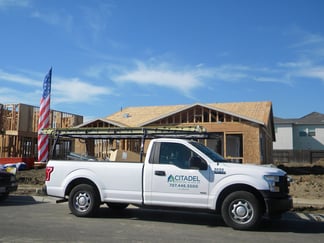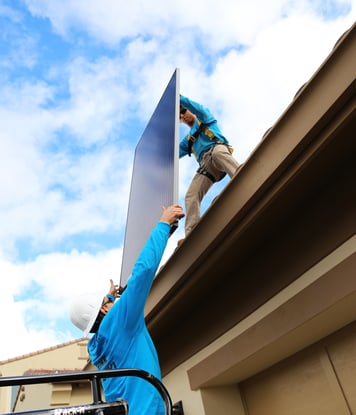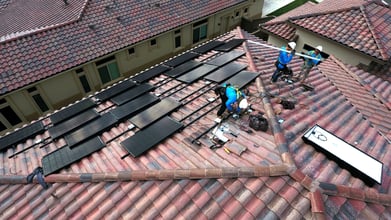California’s new requirement that homes built after January 1, 2020 must have solar energy systems on their roofs is causing some confusion among consumers. Here’s the straight scoop on what this new energy standard really means, along with our take on a few key points.
What exactly is the new solar requirement?
It’s simple: New homes built in 2020 and afterward must have solar electric systems installed on their roofs during the construction phase. The systems will be sized to offset the home’s expected electricity needs.
 Does it apply to all new home construction?
Does it apply to all new home construction?
It applies to most new home structures up to three stories high, including single-family homes, and multi-family buildings including condominiums and apartment buildings.
Who installs the solar?
Homebuilding contractors are expected to work directly with solar companies to install solar energy systems during the home construction process. This means you won’t have to research solar, choose an installation company and arrange payments; the homebuilder will do that for you.
How will I know the solar company chosen by the homebuilder did a good job?
A great question! Definitely ask which company installed your solar and check out their reputation through online reviews. In today’s active California solar market, not all residential installers are as concerned with quality and customer satisfaction as they should be. At Citadel Roofing & Solar, we pride ourselves on delivering both for Northern and Southern California, with offices in Vacaville, Roseville, and Valencia.
How will I know if my solar energy system is working as it should?
The details of how the homebuilder, the solar company and the home buyer will interact and communicate have not been addressed yet. Much of that will be up to the homebuilder.
Citadel Roofing & Solar’s take: At Citadel, we are proud of our work and hope to put our name on any systems we install on new homes. And we welcome the opportunity to communicate directly with our customers, should you have questions or need occasional maintenance.
What will solar add to the price of a new home?
The California Energy Commission estimates the addition of solar to increase the upfront price of a home by nearly $10,000. That comes out to roughly $40 more on an average monthly mortgage payment, or $480 per year. But — and this is a big but — that cost will be more than offset by electric bill savings.
Citadel Roofing & Solar’s take: While it’s impossible to predict for sure the prices for solar on new homes, because many partnerships between building contractors and solar companies are not in place yet, we can say based on our experience that installing solar during construction could result in lower solar prices for consumers compared to installing your own solar directly with a solar company. That’s just the nature of business. Installers like Citadel will be able to offer builders a lower price for solar in exchange for the volume of business. And home buyers will reap the benefit.
Ok, I'm listening. What will solar save me?
The Energy Commission estimates solar will save you $19,000 over the course of a 30-year mortgage, which comes out to $80 in monthly savings, or $960 a year.

When you add in the many other energy-efficiency standards in the state’s building code, new homes should use 53% less energy than homes built under the previous code, according to the Energy Commission. That is enormous progress toward a stable energy future. And it puts extra money in your pocket.
Citadel Roofing & Solar’s take: We as consumers need to shift our thinking from focusing solely on the purchase price of a home, and broaden it to include the “operational” costs of running a home. Factors like heating fuel type and energy efficiency measures impact what you’ll spend to keep your home comfortable, for decades to come. This mindset is present to some extent today: People are happy to see their new home come with energy-efficient windows or a modern heating system. The new solar requirement is a step toward the longer-range view, one that will benefit homeowners and the planet greatly over time.
And let’s not forget that having free or cheap electricity often inspires people to buy energy-efficient technologies like electric cars, heat-pump water heaters, and air-source heat pumps, all of which reduce your energy costs even more.
Do I have to buy solar as part of my new home?
 Well, your new home has to have solar, as we’ve said. But your homebuilder may offer several options for the financial part of the equation, such as:
Well, your new home has to have solar, as we’ve said. But your homebuilder may offer several options for the financial part of the equation, such as:
-
You buy the solar energy system outright, as part of your new home. That means it’s included in your mortgage, or your cash payment if you’re lucky enough to have the means to pay cash.
-
You lease the solar panels through what’s called a power purchase agreement (PPA) with the home developer.
-
The new standard also allows for communities to work together and offer another option such as a community solar system, instead of requiring individual systems on each home.
Citadel Roofing & Solar’s take: Purchasing solar, with or without the help of a mortgage or other bank loan, is far more beneficial to the consumer, meaning you will save more over time than if you enter into a PPA.
Are there other requirements besides the solar?
The building code requires numerous other energy-efficiency measures in new home construction, as mentioned above. And it encourages, but does not require, the installation of high-capacity battery systems to store the home’s solar energy when it is not used immediately. We’ll post more about batteries at a later date.
Does having solar on my roof mean I'll still have power during an outage?
Citadel Roofing & Solar’s take: For today, no. Solar owners cannot generate their own electricity during a power outage because the current must be cut off to keep the utility workers safe during their repairs. However, in the future, solar is seen as a way to increase grid “resiliency” and allow power to be produced even when utility infrastructure is damaged from, for example, a storm or other natural disaster.
Why was the solar standard created? Aren't homes expensive enough?
Our state has an ambitious environmental agenda, including a goal of getting all our electricity from renewable energy sources by 2045, and achieving carbon-neutral energy status within 30 years. The requirement for solar on new homes is a big stride forward toward those goals.
Citadel Roofing & Solar’s take: It’s true that California has very high housing prices. But try to remember, the extra cost will be paid off and then some over the years that you own the home. And should you sell before you’ve recouped your cost, simply factor the remainder into your sale price, to keep yourself “whole”.
 But aren't enough people already installing solar?
But aren't enough people already installing solar?
Even though California is a national leader in solar adoption, only 9% of single-family homes in our massive state have solar today, and only 15-20% of new single-family homes being built include solar. That’s not enough.
Citadel Roofing & Solar’s take: Many people do not like being told what to do by our government leaders, especially if it goes against our values. But solar is widely supported by people of all political parties, and the Earth is in dire shape with the effects of climate change becoming more apparent every day. We believe solar is part of the solution to saving our world, and we support this requirement which will help give more people access to emissions-saving, cost-saving solar.
How significant is this?
The measure is the first of its kind in the country. California is again leading the way on innovative measures to reduce greenhouse gas emissions.
Citadel Roofing & Solar’s take: The beauty of the new solar requirement is that it reduces your energy costs and saves you money, in addition to helping the world. It’s a win-win.
How did this become an official requirement?
In May 2018, the California Energy Commission endorsed it as an addition to the state’s Green Building Standards Code. In December 2018, the state Building Standards Commission held a public hearing and then approved the addition of the standard to the state’s Code of Regulations, in the section called Title 24 Building Energy Efficiency Standards.
Does everyone support this change?
No. Some builders wish the change had come about more slowly, and some realtors are concerned about our already high housing prices going up, which could slow new home construction and our active real estate market.
But overall, the measure has widespread support, from the California Building Industry Association, environmental organizations including the Natural Resources Defense Council (NRDC) and the Sierra Club, and even the big utilities, which are not always considered pro-solar.
Watch this space for updates on the new solar requirement in the coming months.


